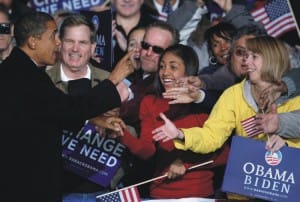Obama-mania is sweeping world

US Presidential nominee Sen Barack Obama (D-IL) (L) greets supporters during a campaign rally at Verizon Wireless Virginia Beach Amphitheater on Thursday in Virginia Beach, Virginia. Obama continues to campaign against Republican presidential nominee Sen. John McCain (R-AZ) as Election Day draws near.Photo: AFP
Obama-mania is sweeping the world -- the Democratic presidential candidate is much more popular than Republican rival John McCain in surveys of people around the world.
But underlying Obama's global popularity is a lack of understanding of his ideas, experts say.
Obama is the preferred candidate of 42 percent of the people in the world, while only 12 percent would vote for McCain if they had the chance, according to a BBC survey of 2,500 people in 22 countries.
In Europe, Obama is particularly popular: more than 80 percent of Germans, French and Dutch have a favourable view of him, according to a poll sponsored by the German Marshall Fund.
By comparison, McCain's top score in Europe was in Portugal, where 35 percent liked him.
But Max Wolff, a lecturer at the New School University in New York, says there is a huge gap between Obama's image abroad and the reality of his policy ideas.
Outgoing President George W. Bush "has become the incarnation of the worst of America as a religious crazy, unsophisticated, heavily armed child of the worst European peasantry," Wolff told AFP.
On the other hand, he said, "Obama's image in Europe for those who like America is that he personifies all that is good in the US."
For them, Obama represents "a young, hopeful, multiracial society, an international creative child of Europe; useful, energetic."
"But the two visions are fantasy," Wolff said. "The reality has nothing to do with that, although both of those elements are in the US."
Obama appears to both Americans and Europeans as someone who can bring about change. But in two major areas of responsibility, the economy and foreign affairs, Wolff says not to expect any 180 degree turn.
Among his economic advisers are Austan Goolsbee, from the University of Chicago, which Wolff says is "the ultimate orthodox neoliberal economic programme on earth"; Paul Volcker, "the architect of the monetary policy revolution under (president Ronald) Reagan;" and Jason Furman, who Wolff says has been "a free trade advocate for Wal-Mart."
On foreign policy, Obama counts among his advisers his vice presidential running mate Joe Biden, "one of the proponents of war in Iraq"; and Zbigniew Brzezinski, the former national security adviser of president Jimmy Carter who Wolff calls a "hawk".
For Julien Vaisse, a French historian at the Brookings Institution think-tank in Washington, one has to see Obama's economic, political and social policies from an American perspective.
While the Democrats are much closer to Europe than the Republicans, he said, Obama's plan to widen health care coverage is still very far from Europe's system of guaranteed access to health care for everyone.

 For all latest news, follow The Daily Star's Google News channel.
For all latest news, follow The Daily Star's Google News channel. 



Comments